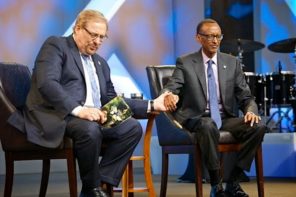In his statement this morning condemning Uganda’s proposed criminalization of homosexuality, Rick Warren omitted some critical items. While he condemned the proposed law in Uganda, and dissassociated himself from the anti-gay pastor Martin Ssempa, he neglected to address hateful homophobic rhetoric by other pastors with whom he continues to partner.
Last month, Ssempa told me he was mystified by Warren’s cutting of ties with him, since they both hold “similar biblical positions on homosexuality,” as do other religious leaders in Uganda and in Rwanda, which is Warren’s first “purpose-driven nation.”
A law criminalizing homosexuality (although with lighter sentences than in the proposed Ugandan law) has been proposed in Rwanda. There, the Archbishop Emmanuel Kolini, head of the Province of the Anglican Church of Rwanda, has said, “Even when the government decides to legalise homosexuality our church will not accept it its totally illegal and un-Godly.” Kolini serves on the Steering Committee for Warren’s Purpose Driven/P.E.A.C.E. Plan in Rwanda, and works on HIV/AIDS issues. In 2003, Kolini said in an interview, “the Bible carefully sexual sin comes from within and if I reflect carefully it has more consequences than any other sin – there is venereal disease gonorrhea, and now there is HIV/AIDS. There are very serious consequences to sexual sin we cannot ignore. God has been warning people over and over and over.”
Kolini has split from the Anglican Communion over ordination of LGBT clergy, and has advocated fighting homosexuality within the Communion, along with other Africans like Peter Akinola of Nigeria, whom Warren has also praised. Akinola called the consecration of Episcopal bishop Gene Robinson “a satanic attack on the church of God.” In 2007, Kolini told the New Times that homosexuality was tantamount to genocide. It’s difficult to think of a more incendiary statement for Warren’s point man for his P.E.A.C.E. Plan in Rwanda, which is supposed to “promote reconciliation” and “equip leaders.”
The proposed criminalization laws are a manifestation of this homophobia. Even without criminalization laws, LGBT people suffer discrimination and violence, including the verbal violence of religious leaders that Warren continues to promote. In a way, you can understand Ssempa’s bewilderment: why is he cut off, but not Akinola or Kolini? Warren’s belated condemnation of the proposed law is surely welcome, but should hardly end questions over his role in the cultural and religious climate of homophobia on the continent and around the world.




